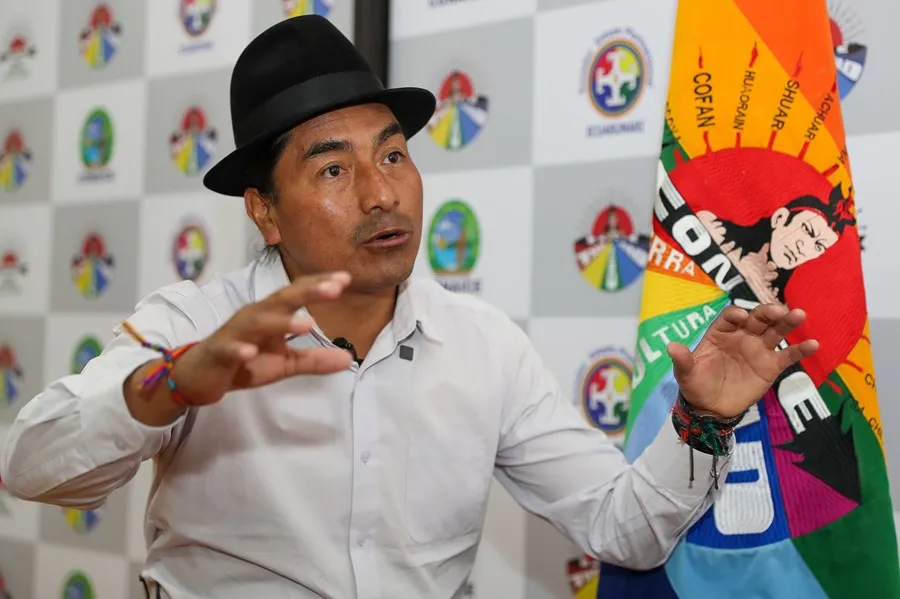International
Indigenous candidate Leonidas Iza predicts a new social explosion if there is no change in Ecuador

The presidential candidate of Ecuador for the indigenous movement, Leonidas Iza, who was part of the wave of protests of 2019 and who led that of 2022, reveals himself as an “anti-system” politician in the face of “a corrupt system” that he intends to reformulate to relieve the impoverished, because he predicts a new social explosion if there is no change in the Government to meet popular demands.
Iza, 42, is the candidate of Pachakutik, the political arm of the Confederation of Indigenous Nationalities of Ecuador (Conaie) that he himself presides over, and with which he was at the forefront of the 2022 wave of protests against the government of conservative President Guillermo Lasso, where he was arrested and even labeled a “terrorist.”
“I am one of those who has never lost the ability to be outraged when governments have had policies against their own citizens,” Iza, a native of the Andean province of Cotopaxi, said in an interview with EFE.
“I am not against the private sector, I am against those who do not pay taxes and those who come to the Government only to defend their companies,” said the candidate in reference to the last two presidents (Lasso and Daniel Noboa).
“We fight for social justice, not to be violent. It is a reaction to the injustice to which we have been subjected,” he said.
For Iza, who represents the anti-extractivist left of Ecuador, the country has “a corrupt system, a health system that does not work, a deficient and unfair economic system, and public services that are not helping citizens.”
“And that’s what we want to change. We won’t be able to do it overnight, but the State can give relief to the people,” the candidate said.
To do this, it proposes to fight against tax evasion, which amounts to about 7.5 billion dollars a year, and also against corruption, which is estimated at about 3 billion dollars per year, to balance public accounts without having to follow the current credit program with the International Monetary Fund (IMF) that asks to cut public spending and raise taxes.
He also aimed to increase agricultural productivity, as well as boost tourism to go from 1 to 3 million visitors a year, and anticipated that he will regulate small and artisanal mining to avoid illegal mining but will not allow large-scale mining because it considers that it can contaminate the country’s large river basins.
Iza anticipated that he will not pay the external debt as long as there are “guaguas (children, in Kichwa) who have no education and are dying of hunger, and colleagues who are dying for lack of health.”
“We will tell the IMF and the other multilaterals that we are going to pay, but first we are going to solve the structural problem we have at the moment: education, health and minimum conditions for security,” he warned.
In that sense, Iza pointed out that “the strength of a popular reaction in the streets is accumulating” that must be resolved by whoever is elected. “Knowing my country, which has been on the streets all its life, there will be a popular reaction if (the discomfort) is not resolved in the following months,” he reiterated.
“The option that understands the people is us, and not the sectors that have always been in the Government,” said Iza, who avoided pointing out whether that reaction will reach the dimensions of the strong protests of 2019 and 2022, both led by the indigenous movement.
In this electoral campaign, Iza has left his distinctive Andean red poncho to put on the bulletproof vest in the face of the persistent wave of violence of organized crime that the country is experiencing, because he warned that the “war” that Noboa declared to the criminal gangs has not worked because its leaders are still free.
Faced with this, he promised “a hard hand for all” and recalled that “state institutions must suffocate everyone (criminals)”.
The candidate also advocated deepening international cooperation: “there must be a responsibility of all countries (producers, consumers and drug transit), especially in the region (of Latin America)”.
Asked if Ecuadorian society is ready to have an indigenous president of rural origin, Iza sees himself with popular support to face “the most reactionary sectors that have support in racism and stigmatization.”
International
Florida judge sets 2027 trial in Trump’s $10 billion lawsuit against BBC

A federal judge in Florida has scheduled February 2027 for the trial in the lawsuit filed by U.S. President Donald Trump against the BBC, in which he is seeking $10 billion in damages for defamation.
Trump accuses the British broadcaster of airing a misleading edit of a speech he delivered on January 6, 2021, which, he says, made it appear that he explicitly urged his supporters to attack the U.S. Capitol in Washington.
The president filed the suit in December in federal court in Florida, alleging defamation and violations of a law governing business practices when the program was broadcast ahead of the 2024 election.
Trump is seeking $5 billion in damages for each of the two claims.
Lawyers for the BBC unsuccessfully asked the court to dismiss the case, arguing that Trump had not suffered a “legally recognizable harm,” since the investigative program Panorama, which included the edited footage, aired outside the United States.
International
Head-of-state diplomacy key to guiding China–U.S. ties, Beijing says

Head-of-state diplomacy plays an irreplaceable strategic guiding role in China–United States relations, Chinese Foreign Ministry spokesperson Lin Jian said on Thursday during a regular press briefing, when asked about high-level exchanges between the two sides.
Lin added that in a recent phone call, U.S. President Donald Trump once again expressed his intention to visit China in April, while Chinese President Xi Jinping reiterated his invitation.
Both sides remain in communication regarding the matter, the spokesperson said.
Lin noted that the essence of China–U.S. economic and trade ties lies in mutual benefit and win-win outcomes.
“Both parties should work together to implement the important consensus reached by the two heads of state, injecting greater certainty and stability into China–U.S. economic and trade cooperation, as well as into the global economy,” he said.
International
Trump administration to end special immigration operation in Minnesota

The administration of Donald Trump is bringing to a close its special operation targeting illegal immigration in the northern state of Minnesota, border czar Tom Homan announced Thursday, following weeks of unrest and the fatal shootings of two activists by federal agents.
Thousands of federal officers had been deployed to Minnesota in December to carry out large-scale raids against undocumented immigrants.
The operations triggered strong reactions from residents and advocacy groups, leading to daily confrontations and the deaths of two people who were shot by federal agents.
“I proposed, and President Trump agreed, that this special operation should end in Minnesota,” Homan said during a press conference in the state capital, Minneapolis.
“A significant drawdown began this week and will continue into next week,” he added.
Homan indicated that similar enforcement efforts could be launched in other cities.
“Next week we will redeploy the agents currently here back to their home stations or to other parts of the country where they are needed. But we will continue to enforce immigration laws,” he said.
-

 Central America4 days ago
Central America4 days agoGuatemala isolates Barrio 18 leader after attacks that killed 11 police
-

 Sports5 days ago
Sports5 days agoShakira ignites El Salvador with near sold-out residency at Mágico González Stadium
-

 International2 days ago
International2 days agoU.S. Health Department says CDC grants no longer match agency priorities
-

 International1 day ago
International1 day agoOver 50 Civil Groups Urge House to Impeach DHS Secretary Kristi Noem
-

 International2 days ago
International2 days agoICE Arrests Reach 379,000 Under Trump, Testimony Shows Amid Minnesota Shootings
-

 Central America1 day ago
Central America1 day agoGuatemala to Phase Out Longstanding Medical Cooperation Agreement with Cuba
-

 International2 days ago
International2 days agoDespite homicide drop, overall deadly violence remains high in Mexico: study
-

 International2 days ago
International2 days agoSheinbaum Urges Mexico to ‘Jealously’ Guard Sovereignty at Air Force Anniversary
-

 International2 days ago
International2 days agoMEPs Approve Plan That Could Fast-Track Rejection of Some Asylum Claims
-

 International2 days ago
International2 days agoJet Fuel Crisis Hits Cuba: Flights Disrupted, Air Canada Cancels Services
-

 International1 day ago
International1 day agoNew York’s New Archbishop Names Óscar Romero as His Favorite Saint
-

 International2 days ago
International2 days agoMexico Rises Slightly to 141st in Global Corruption Perceptions Index 2025
-

 International4 hours ago
International4 hours agoFlorida judge sets 2027 trial in Trump’s $10 billion lawsuit against BBC
-

 International4 hours ago
International4 hours agoHead-of-state diplomacy key to guiding China–U.S. ties, Beijing says
-

 International4 hours ago
International4 hours agoTrump administration to end special immigration operation in Minnesota
-

 International1 day ago
International1 day agoExclusive Tucson Neighborhood Shaken by Disappearance of Savannah Guthrie’s Mother
-

 International2 days ago
International2 days agoChile Unveils Latam-GPT to Give Latin America Its Own AI Model


























